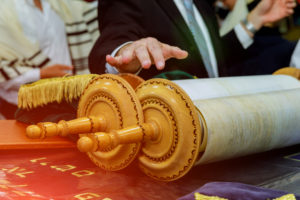
By Rabbi Ron Symons
Parshat Pinchas
Perhaps you remember the 2020 census. I know, it seems like it was so long ago.
The arguments about citizenship questions and deadlines, enumerators and computer forms, congressional districts and federal funding — it seems like a lifetime ago because of COVID, and yet the results will guide us for the next 10 years … until we get to census 2030 as mandated by the Constitution.
In this week’s Torah portion, Pinchas, we again turn our attention to a census of ancient Israel. This is the fifth of 10 censuses the people of Israel have and will take in the ancient world:
On 10 occasions were Israel counted:
Once when they went down to Egypt [Genesis 46:27].
A second time when they came out [Exodus 12:37].
A third time after the incident of the Golden Calf [Exodus 30:12].
Twice in the Book of Numbers:
o Once in connection with the formation of the camps [Numbers 1].
o and once in connection with the division of the land [Numbers 26].
Twice in the days of Saul [1Samuel 11:8, 15:4].
The eighth time in the days of David [2Samuel 24:9].
The ninth time in the days of Ezra [Ezra 2:64; Nehemiah 7:66].
The tenth time will be in the future era of the Messiah, when, [as Jeremiah said:] The sheep shall pass again under the hands of one who counts them [said the Eternal]. [Jeremiah 33:13].
We know that there are practical reasons for all this counting. Knowing how many people live in our community both today and in the ancient world affords us the data we need to feed and care for the most vulnerable, to assure the rights and responsibilities of community, and to prepare for a future of abundance for the sum of us rather than just for some of us.
According to Rabbi Lord Jonathan Sacks, z’l, all of this is important from a human perspective. While we need to know all of that, there is another reason, he argues in “What Counts,” why counting must happen from a spiritual perspective:
A Divine census is utterly different [than a human census]. It has nothing to do with strength-in-numbers. It has to do, instead, with conveying to every member of the nation that he or she counts; that every person, family, household is held precious by God; that distinctions between great and small, ruler and ruled, leader and led, are irrelevant; that we are each God’s image and the object of His love. A Divine census is, as Rashi says, a gesture of endearment. That is why it cannot be described by the usual verbs of counting — limnot, lifkod, lispor, lachshov. Only the phrase naso/se’u et rosh, “lift the head,” does justice to this kind of enumeration, in which those entrusted with the task are commanded to “lift the head” of those they count, making every individual stand tall in the knowledge that they are loved, cherished, held special by God, and not merely a number, a cipher, among the thousands and millions.
The work of the Divine census must continue long after census 2020 and long before census 2030. We, not God, must continue the work with the same intentionality we applied to census 2020.
In her most recent book, “The Sum of Us: What Racism Costs Everyone and How We Can Prosper Together,” Heather McGhee proves chapter after chapter how the impact of racism costs all of us, not just those who are the object of racism.
While she proposes the “solidarity dividend,” I suggested to her that we can nuance the phrase to be the “solidarity redemption.” You see, when the Hebrew slaves left Egypt some 3,000 years ago, we did not leave by ourselves. Without checking off a box on a form to see what race, ethnicity, gender identity, sexual identity, country of origin they were, a mixed multitude of people were a part of our “we.”
All of us, the sum of us made it through the plagues, got to the water’s edge, were confronted by Pharoah, marched through the mud, helped each other as we fell and rose together, and finally the sum of us, all of us, danced on the other shore of the sea as we continued our journeys through all the challenges of living together in community.
We will state it because it will be true as a result of our shared efforts to help “… every individual stand tall in the knowledge that they are loved, cherished, held special by God, and not merely a number, a cipher, among the thousands and millions.”
It will be true because even though humans count humans, we will lift up every head so that we see our neighbors as “neighbors qua moral concept” and not just numbers. It is all about the sum of us, not just some of us. l
Rabbi Ron Symons is the senior director of Jewish life at the JCC of Greater Pittsburgh, where he is the founding director of the Center for Loving Kindness.



